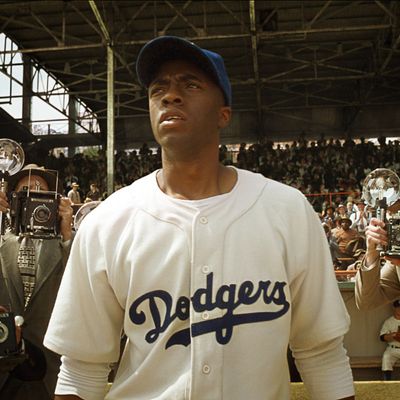
In 42, the great American gods of capitalism and baseball triumph over racism, provincialism, and ignorance, and all is right with the world. Brian Helgeland’s epic about Jackie Robinson’s first year in Major League Baseball is uneven — often exciting, and just as often shallow and ham-handed — but if there’s one thing to which it remains true, it’s that the almighty American greenback and the all-American athlete are the great destroyers of bigotry.
After some brief narration setting the stage (World War II is over, fascism has been defeated abroad, but segregation is alive and well here in the U.S.), the film opens on Branch Rickey (Harrison Ford), general manager of the Brooklyn Dodgers, announcing to his staff that he’s going to hire a black baseball player for the upcoming season. Ford gives Rickey a voice so growly you’d think someone just woke him from a thousand-year nap, and Helgeland plays up the starstruck irony: He reveals his actor’s face with a camera move that circles around from behind to hit us with the full impact of Indiana Jones cast against type. (Sergio Leone deployed a similar camera gag on Henry Fonda in Once Upon a Time in the West.)
“Think about how this is gonna play on Flatbush!” one of Rickey’s men protests, in what is not the film’s sole instance of nudge-nudge counterpoint with the modern day. But Rickey can’t be swayed from his argument: There’s a growing black fan base for baseball, and he wants to tap into it. “Dollars aren’t black and white,” he roars. “They’re green!” As if to prove his point, the very next scene shows us then–Negro League player Jackie Robinson (Chadwick Boseman) convincing a racist gas station attendant to let him use a whites-only restroom by threatening to take his team’s business elsewhere: “We’ll get our 99 gallons of gas someplace else.” Money may not buy us love, but apparently it can buy us social justice.
Of course, Jackie Robinson turns out to be a pretty exceptional baseball player, and we know what that means: “Winning means money,” Rickey explains to his manager Leo Durocher (Christopher Meloni), telling him Robinson needs to be part of the team. Baseball and money soften many a hard heart over the course of 42. Much of this is probably historically accurate, but in true Hollywood fashion, it’s raised to the level of myth, accompanied by Mark Isham’s predictably twinkly, treacly score. (There are something like four musical crescendos in the first fifteen minutes alone.)
The film also makes sure to tie it all into the Christian notion of self-sacrifice. “Like our savior, you gotta turn the other cheek,” Rickey explains, later professing that, as a white man, he’s at a disadvantage to Robinson’s plight: “You’re the one living the sermon,” he points out, a bit too helpfully. To be fair, the real Branch Rickey was very much a God-fearing man, and his conversations with Robinson did reportedly run like this. But again, does the movie have to be so artless about it?
Helgeland’s film is at its best when it focuses on the diamond. As Robinson, Boseman has both physical grace and sly charm. Threatening to steal bases, we watch him toy with opposing pitchers in a nearly silent-film pantomime that’s both playful (because he’s so damned likable) and tense (because practically everyone else is such a fire-breathing racist). In the film’s most effective set piece, Robinson attempts to hit a ball while Ben Chapman (Alan Tudyk), the manager of the opposing Phillies, spews out enough N-word-laden bile to make Quentin Tarantino shrivel up in a fetal position. Credit where it’s due: After a lot of setup, 42 spends most of its time on the playing field, where it is most effective and exciting. Baseball fans will probably eat this stuff up.
At times, the film’s strengths serve to highlight its flaws. Alongside the charismatic Boseman, Nicole Beharie is so passionate as his wife that we wish she had more to do than just swoon and cheer; you might find yourself wondering if this married couple ever had anything resembling a real argument, or even a fight. Ford, for all his hamminess, also brings his scenes a delirious, crowd-pleasing energy — oddly making you wish there was a bit more to him than the long strings of clichés that serve as his dialogue. For all that, though, 42 works, because it practices what it preaches: If you’re good at baseball, nothing else really matters. So forget about story, character, or subtlety. 42 can play, and it knows it.


